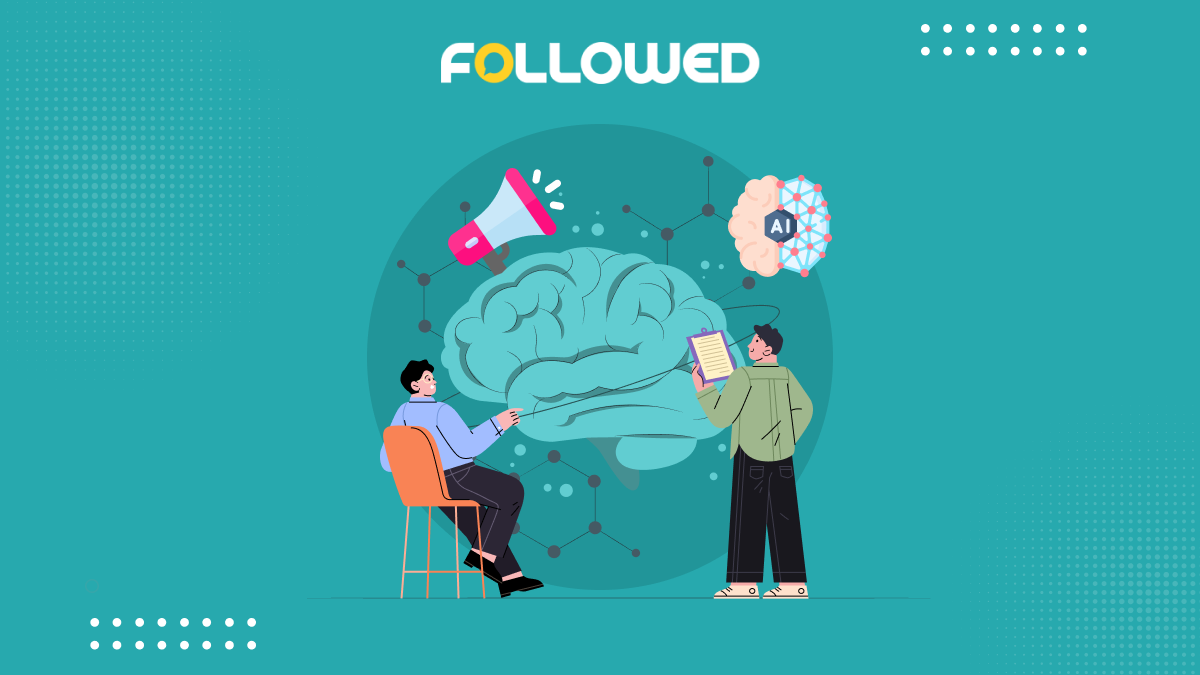As consumers, we’re inundated daily with a variety of marketing messages in print, TV, and online. But how do we determine which ones to trust? How do we know if an ad is authentic or if it’s just trying to sell us something that isn’t necessary? And how can marketers ensure that their message will resonate with customers? In short: neuromarketing. Neuromarketing is an approach to marketing that utilizes scientific findings about the brain and consumer psychology in order to better understand your target audience and improve sales conversions. The concept has been around for more than three decades now and has become increasingly popular among businesses seeking ways to boost their revenue streams through more effective targeting strategies and customer engagement tactics.
Table of Content:
- What is Neuromarketing?
- Why Neuromarketing is Essential for Modern Marketers?
- How can Marketers Benefit from the Knowledge of Neuromarketing?
- What Key Areas a Company Must Focus on to Implement this Strategy Effectively?
- Examples of Neuromarketing
- Which Industries Use Neuromarketing in their Strategy?
What is Neuromarketing?


Neuromarketing is the study of how consumers’ brains react to marketing campaigns. It uses brain scans and other technology to understand consumer behavior so that marketers can use this information to develop more effective marketing strategies.
For example, if you’re selling a new type of car, you might want to know what kinds of colors appeal most strongly to people and why they like them–or if they prefer cars with leather seats over cloth seats or vice versa. You might also want to know how people feel about different features like air conditioning or heated seats before deciding which ones you should include in your design plan for the next model year’s models (and whether it makes sense for those options not just because they’re cool but because they’ll actually sell).
Why is it important?
Neuromarketing is important because it helps marketers understand the consumer better.
This can be done through various methods, including fMRI scans and eye-tracking technology. Understanding the consumer’s decision-making process will allow you to create better marketing campaigns that are more likely to resonate with them.
Additionally, neuromarketing allows you to design better products by understanding what consumers want from their experience with your brand or product. This means developing products that meet actual needs (and not just wants). It also allows you to improve customer experiences by giving them exactly what they need at every touch point along their journey with your company–from shopping online all the way up until after they’ve made a purchase from one of your stores in person!
There are many articles , Blogs and Books on Neuromarketing. which also gives great information and knowledge. Many authors also use these methods for book marketing services.
Why Neuromarketing Is Essential for Modern Marketers?
Neuromarketing can help marketers to achieve these goals by:
- Delivering better results. Neuromarketing allows you to create more effective campaigns, which can lead to increased sales and customer satisfaction. It also helps brands build positive brand perception by providing them with actionable insights into how consumers perceive their products or services in the market. This way, they can improve on what they’re doing right and identify areas where improvement is needed to focus on getting better results in the future.
- Generating better insights. You can better understand what makes them tick by using neuromarketing to understand how consumers think and feel about your brand, product, or service. This allows you to develop strategies that will help you connect with them on an emotional level and increase the likelihood of them buying from you in the future.
- Helping you reach untapped markets. Neuromarketing can give you a competitive advantage by helping you identify and target consumers who are likely interested in your products or services but haven’t heard about them. This way, you can increase sales without having to spend more on marketing efforts.
- Reducing the risk of failure. By using neuromarketing to gain a better understanding of what makes consumers tick and how they think about your brand, product or service, you can reduce the likelihood of making mistakes that could end up costing you money.
- Getting better customer service. You can use neuromarketing to help you understand what motivates customers to buy from you and what makes them decide to stay loyal. This will allow you to create a customer experience that consistently exceeds expectations and keeps people coming back for more.
How can Marketers Benefit from the Knowledge of Neuromarketing?


Neuromarketing can help marketers understand their consumers and how they behave. It allows them to gain a competitive advantage over other brands, increase sales, improve customer experience, and increase brand loyalty by providing better services.
Neuromarketing can also be used in advertising effectiveness by understanding what kind of ads work best for different types of people. It will provide you with insights on how to create products that will sell well in the market as well as understanding what customers’ needs are so that you can create products that meet those needs efficiently.
There are many benefits of neuromarketing, but one of the biggest drawbacks is that it’s a very new field that is still being researched by scientists. It’s hard to find reliable data and even harder to interpret what all of this data means for your business.
Neuromarketing can help you improve the way your company launches new products and services. It’s a growing field that allows marketers to understand what consumers want, think about things, and what drives them to buy.
Neuromarketing has been around for more than 10 years, but it’s still not widely used by companies looking for ways to improve their marketing campaigns. The reason is simple: most people don’t know what neuromarketing is or how it works!
Neuromarketing is the study of how the brain makes decisions. It’s a growing field that allows marketers to understand what consumers want, think about things, and what drives them to buy. Neuromarketing has been around for more than 10 years, but it’s still not widely used by companies looking for ways to improve their marketing campaigns
What Key Areas a Company Must Focus on to Implement this Strategy Effectively?


The following are some of the key areas on which a company must focus to implement this strategy effectively:
- Understanding the consumer: This is probably one of the most important aspects of neuromarketing. You need to understand what motivates your audience and makes them tick because if you don’t know your target customer, how do you expect to reach out to them?
- Understanding the product: The second most crucial element is understanding what your product offers and how it works better than other similar ones in its category. You also need to figure out whether there’s anything new or innovative about it that could help increase sales conversions or gain more market share over competitors’ offerings (if any). This will give marketers all sorts of ideas on how best they could position their products/services so as not only to attract new customers but also retain existing ones by giving them something different from what else is already available out there in the market space today!
- Understanding Market Trends/Market Segments: By understanding trends within each segmented group as well as across all segments combined together simultaneously across multiple time periods (such as quarterly earnings reports), companies can better predict future demand patterns based upon current consumer behavior patterns observed during each season cycle throughout the year long period.”
Examples of Neuromarketing
Neuromarketing is the science of using brain scans and other data to help marketers understand why we make decisions and which factors influence those decisions. The goal is to gain a better understanding of what motivates consumers on an individual level so that businesses can create more effective ad campaigns and products. Here are some examples of neuromarketing in practice from real-world studies.
Fear Appeals
Fear appeals are effective, but they should be used carefully. If you’re selling a product that helps people avoid getting bitten by sharks, fear appeals are great for you! But if your product is something unrelated to sharks (like a new smartphone), fear appeals won’t work as well.
Fear appeals work because people have a natural tendency to avoid pain and discomfort. This means that if someone sees an ad with images of sharks attacking people or other scary things, their brain will tell them “Don’t do that! It’ll hurt!” And then they’ll buy whatever product was advertised in order to protect themselves from what they were shown in the ad–even if it’s not related to what caused their fear response in the first place.”
Reciprocity
Reciprocity is a social norm that obliges us to repay, in kind, what another person has provided us with. In marketing terms this can be used to increase the likelihood of a customer buying a product or service.
For example: if you give away something for free (such as an ebook or marketing gift), then you have created an obligation on your customer’s behalf and they are likely to reciprocate with money for your product/service at some point in future.
Liking
Liking is a shortcut for decision making. The more you know about something, the more likely it is that you’ll like it. This principle can be used to help people make better decisions when they have little time or information available. For example, if someone has just walked into your store and wants to buy something quickly because she’s in a hurry, showing her products that are familiar (because she sees them often) will increase her desire for those items over others in the store.
Liking can also be used as a marketing tool by companies who want customers’ loyalty or repeat business: If customers like an experience with your brand, then they’re more likely to come back again next time around–and become repeat buyers!
Social Norms
Social norms are the rules of conduct that guide our behavior. They can be used to influence behavior, change behavior and even shift social norms.
Social norms are an important factor in any marketing campaign because they help people determine what is acceptable and what is not. For example, if you’re trying to get more people to recycle their trash instead of throwing it away, you’ll want them to know that most people already recycle their trash–a fact that will make them feel less like they’re doing something wrong by recycling themselves!
Authority/Expertise
The authority principle is based on the idea that people tend to follow the direction of a person perceived as an expert. It’s why you often see celebrities endorsing products in commercials, or have your doctor recommend certain medications.
The power of this principle can be seen in many marketing tactics:
- Celebrity endorsements – Celebrities who are known for being good at something (like singing or acting) will often endorse products related to their talent. This gives them credibility and makes people more likely to buy what they’re selling because they trust that someone so skilled would only promote quality products.
- Testimonials – People who have used a product before are more likely than others who haven’t used it yet (or at all) to say good things about it; testimonials provide third-party validation for your product or service — even if those testimonials come from celebrities!
- Expert reviews – Reviewers are often experts within their field who know what makes one product better than another; by reading reviews written by these experts, consumers gain insight into which brands might suit their needs best based on firsthand experience rather than just hearsay alone.”
Scarcity/Urgency
Scarcity, urgency and loss aversion are powerful motivators that can drive consumers to take action.
- Scarcity: The feeling of missing out on something is a powerful motivator for consumers. This can be seen in cases where someone has waited too long to purchase an item and now it’s sold out or when there are limited quantities available at a discounted price.
- Urgency: The feeling that you need to act immediately is another strong motivator for consumers because it creates the sense of urgency that they need something right away before they miss out on their opportunity altogether. Examples include flash sales or online auctions where bidders have only seconds before bidding closes–and winning means paying more than if they had waited until later!
Happiness/Positivity
The happiness and positivity you feel when you see a product, brand or service is more likely to be shared with others.
Positive emotions are also more likely to influence your actions. In other words, if you’re happy about something then it’s more likely that you’ll buy it or use it.
Finally, positive emotions create better memories than negative ones do by making our brains work differently when we experience them; this means that if someone feels good about something then they are more likely to remember it later on down the line!
Anger and Rage (but not too much)
Anger is a powerful emotion. It can motivate people to take action and increase urgency, which are both important for getting your message across. The key is knowing how to use anger in the right way and at the right time.
It’s important to remember that anger isn’t always good; too much of it can turn off customers or drive them away entirely. If you’re trying to sell something on Amazon, for example, angry reviews could hurt sales by making potential customers wary of buying from you–and if they do buy from you after reading an angry review then there’s no guarantee that they’ll come back again later (or recommend others do so).
Read More: How to Create Interactive Posts on Social Media in 2023?
Which Industries Use Neuromarketing in their Strategy?
There are many applications of neuromarketing, but here, we’re going to focus on the industries that most often use it. We’ll be talking about who is using it and how they are using it for their marketing strategies.
Pharmaceuticals
Neuromarketing is used by pharmaceutical companies to develop new drugs. Neuromarketing has been used in many different ways by pharmaceutical companies over the years. For example, one study showed that people who were given a placebo were more likely to feel better than those who weren’t given any treatment at all! They found this out by asking people questions about their symptoms before giving them either placebos or actual medications for their condition (Cahill et al., 2003). Another study looked at whether certain types of advertisements would make people want certain kinds of painkillers more than others (Lacourse & Royer-Vincent, 2007).
Consumer Goods Marketers
The consumer goods marketer’s job is to determine what products consumers want to buy and how much they are willing to pay for them. This can be a tricky task, especially when there are so many factors at play. Consumer goods marketers need to consider all aspects of their industry, from trends in technology and culture to competition between brands. They also need a deep understanding of how consumers think and behave when making purchasing decisions–and this is where neuromarketing comes into play.
Neuromarketing uses neuroscience research methods as part of its strategy for understanding consumer behavior and making better marketing decisions. By studying how neurological processes interact with stimuli like images or sounds (or even just words), neuromarketers can predict what kind of impact those stimuli will have on consumers’ brains–and therefore how effective they’ll be at selling products!
Food and Beverage Industry
The food and beverage industry is one of the world’s largest industries, generating over $1.3 trillion in revenue each year. This industry has been growing at an average rate of 5-6% per year since 2010, making it a prime target for neuromarketing strategies.
Many companies are using neuromarketing techniques to develop better products and improve their customer experience as well as increase sales revenue by understanding what customers want better than they do now. In addition to this, there are many other applications for neuromarketing which may not be obvious at first glance but are equally important nonetheless:
- Marketing research firms can use this knowledge to develop more effective ad campaigns that target specific emotions rather than generic ones like happiness or satisfaction;
- Retailers can use this information when deciding which products should go where within their stores based on how accessible different areas are from each other (i.e., if you put all your most expensive items near entrance doors then customers won’t spend much time browsing);
Luxury Marketers
Luxury marketers need to know how to create a luxury brand that stands out from competitors. They need to know how to appeal to customers, and they also need the ability to understand how their target audience perceives their product or service.
Neuromarketing is used in this industry because it can help marketers understand why people buy certain things over others based on their senses, such as sight or smell. This information can then be used by companies like yours when creating new products or services for your customers’ enjoyment!
One of the first steps to creating a luxury brand is to identify your target audience. You need to know who they are, what they like, and how you can make them happy with your product or service. After that, you should study how this demographic perceives things like scent, color and touch so you can use this information when deciding on packaging for your product.
Services Marketers
As a service marketer, you want your customers to feel valued and respected. You want them to know that you are there for them and not just trying to make a quick buck.
One way that you can do this is by using neuromarketing techniques in your marketing strategy. This will allow you to better understand what makes people decide on buying products or services from a particular company, as well as how best they can be persuaded into doing so.
Neuromarketing helps businesses connect with their customers on an emotional level by showing them how much the business cares about them as individuals rather than just another number in their database or dollar sign on their balance sheet
Insurance and Financial Services
If you’re in the insurance or financial services industry, you may have heard of neuromarketing. But do you really know how it can help your business?
Neuromarketing uses neuroscience-based techniques to help companies understand how customers think and make decisions. It allows marketers to learn more about their audience and make better choices when choosing what products or services to offer them.
For example, let’s say that I’m looking for a new car insurance policy on my website. After reading through all of the options available from different companies (and narrowing down my list based on price), I decide which one seems best for me based on what they offer–and then click “buy.” At this point in time there are two things going on: 1) My brain is starting its process of making rational decisions based on available information; 2) My emotional responses are being triggered by certain words used within each ad copy (e.g., “Peace Of Mind”).
IT Channel Partners
If you are an IT channel partner, you can use neuromarketing techniques to gain insights into your target audience’s preferences, emotions, and decision-making processes. For instance, you can use tracking to see which parts of their website or marketing materials attract the most attention, or they can use EEG or fMRI to measure brain activity when consumers are exposed to different marketing stimuli.
By applying these techniques, IT channel partners can identify the most effective marketing messages, visuals, and calls-to-action for their target audience, and adjust their marketing strategies accordingly. This can help them to increase their brand awareness, customer engagement, and sales.
Additionally MSP sales automation with neuromarketing can help MSPs increase brand awareness, customer engagement, and sales. By gaining a deeper understanding of their target audience’s behavior and preferences, MSPs can develop marketing strategies that resonate with customers on a subconscious level, resulting in more effective communication and conversion.
Conclusion
Neuromarketing is a new way of marketing products. It’s based on the fact that the brain is a complex organ and it can be influenced by marketing tactics, like colors and sounds, which are used in neuromarketing. Neuromarketing uses neuroscience and psychology to influence the way people think and act when they interact with other people or things. Companies like Google, Microsoft, HTC etc uses neuromarketing to make better products.
We hope this article has given you a good overview of what neuromarketing is and how it can be implemented to improve marketing campaigns. There are many more benefits to be gained by using this strategy, but it’s important not to get carried away with all the hype surrounding neuromarketing right now. As always, keep your eyes on the prize and think about what makes sense for your business objectives!
Frequently Asked Question
What is neuromarketing?
Neuromarketing is the science of using brain scans to understand the effect of marketing on consumers. It’s a relatively new field, and there are many questions about how it works, why it’s important, and how it should be used in practice.
Can you use a lie detector to detect people who lie about products?
Neuromarketing or Neuromarketers can use lie detectors to detect people who are not honest about their opinions. However, it is important to note that lie detectors are not 100% accurate, so it is important that you know how they work and how to use them properly.
Does neuromarketing violate people’s privacy?
Neuromarketing does not violate people’s privacy. It is just a way to understand how consumers react to marketing. Neuromarketing does not track people’s movements or activities and is not used to predict future behavior.
Can marketers use subliminal messages in advertisements?
The answer is no. Subliminal messaging is a marketing technique that uses messages so quickly and subtly that the brain does not register them consciously. The idea behind subliminal messaging is that these hidden messages will affect our behavior in some way, but there’s no evidence to prove this theory. In fact, scientists have found that subliminal stimuli are not even processed by the brain at all–they simply go unnoticed by consumers who see them or hear them!
Can we use Neuromarketing for more than just advertising?
Neuromarketing is a growing field, and it’s not just for advertising. You can use neuromarketing to improve the way you launch your products and services by understanding how consumers will react to them. That’s because marketers have long known that emotions play an important role in decision-making–but only recently have they been able to measure these emotions at scale using brain imaging technology.


